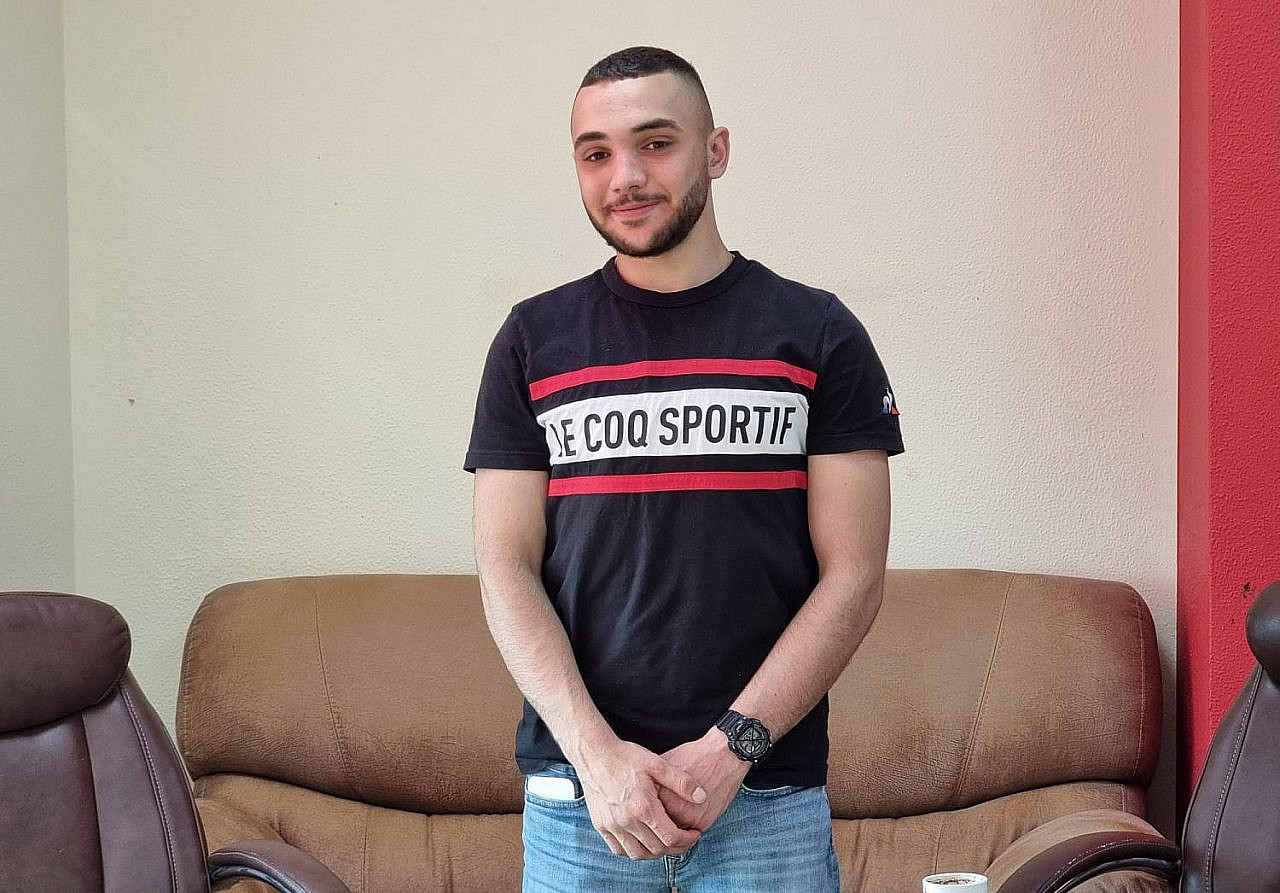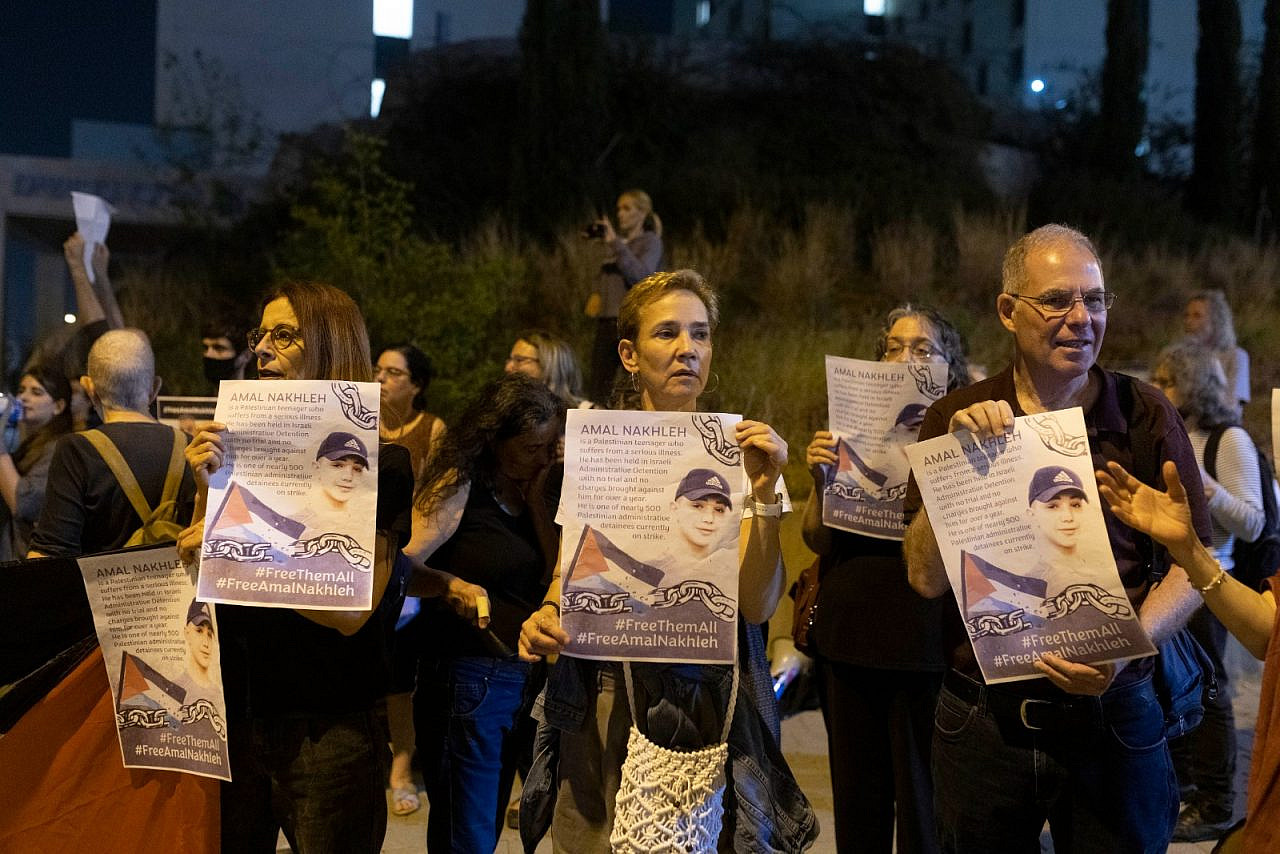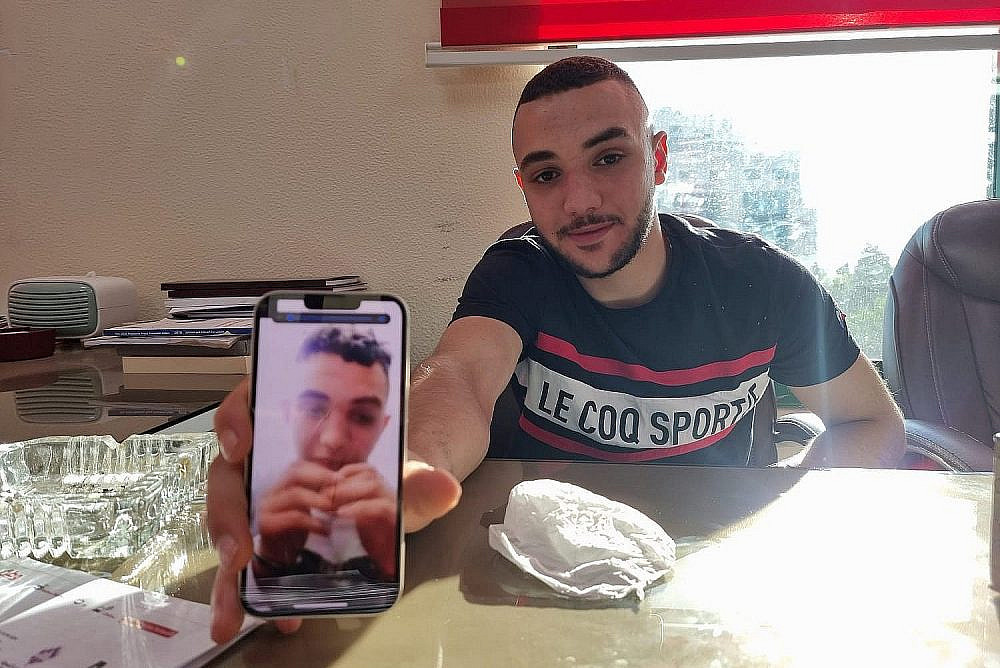An Israeli military court ordered his release on medical grounds. Then the Shin Bet locked him up for another 16 months without charge.

Amal Nakhleh shows a photo from his arrest, with his hands bound in handcuffs, Ramallah, occupied West Bank, May 24, 2022.
This article was published in partnership with Local Call.
A blond man from the Shin Bet, Israel’s internal security agency, put two bowls of sunflower seeds and pecans on the table and asked Amal Nakhleh — then an 11th-grade student — if he wanted a smoke. Nakhleh, a pale boy whose hands had turned red due to the strain from the handcuffs around his wrists, said no.
It was his fourth month in prison under administrative detention, without having stood trial or having been charged with any crime since his arrest in January 2021. His detention order was due to expire and he was waiting to be released so he could go home to Jalazone Refugee Camp, near Ramallah.
According to Nakhleh, the Shin Bet agent told him that if he wanted to be released he must promise that he would pass on information from inside the camp — to become a collaborator. “He said it to me clearly,” Nakhleh told +972 last month, after having finally been released from administrative detention after 16 months in jail without trial.
“If you refuse, I will keep you in administrative detention,” the man told him. “If you help me, I will help you and you can go home.” But Nakhleh did refuse, because “I do not want to be a collaborator,” and he was taken back to the minors’ branch at Ofer prison.
The Shin Bet and the military would subsequently extend Nakhleh’s detention three more times. Only eight months after he was arrested did they allow his parents to visit him for the first time. His father, Muammar Nakhleh, said that he couldn’t recognize his son because of his muscle growth and new beard.

Amal Nakhleh pictured after his release from 16 months in Israeli prison without charge, Ramallah, occupied West Bank, May 24, 2022. (Yuval Abraham)
“His childhood disappeared there,” his father told +972 in his office at the Palestinian news agency Wattan, which he manages, moments before his son walked into the room for the interview.
“Each time I was supposed to be released when the period of my administrative detention ended [initially after six months, then every four months], and I was already dressed up [to leave], they would renew it again,” Nakhleh said, glancing every now and then at his father who was on the phone.
‘Work with me and I will give you money’
Administrative detention is based on supposedly secret evidence, which the Shin Bet claims proves that the detainee is likely to “endanger the region.” The campaign for Nakhleh’s release attracted attention from activists around the world, both because he is a minor and because he suffers from a rare autoimmune disease called Myasthenia Gravis, which affects the muscles and can also affect breathing.
A few days before Nakhleh’s release, the blond man from the Shin Bet summoned him for another conversation. Nakhleh understood from the way the man spoke this time that he was about to be released.
“He asked what I will do when I am out, and I said I do not know,” Nakhleh recalled. “He said: ‘What was your dream when you were young?’ ‘To be a football player in Real Madrid,’ I told him.

Left-wing Israeli activists protest in front of the Shin Bet’s headquarters, calling for an end to administrative detention and the release of Amal Nakhleh, Tel Aviv, April 17, 2022. (Oren Ziv/Activestills)
“Then he tried to trick me,” Nakhleh continued, “and said: ‘I will show you Cristiano Ronaldo and Benzema, and you’ll give me intelligence information?’ I told him that I loved them when I was a kid but I’m not a kid anymore and I do not care about them. Then he told me: ‘If you are out, I will prevent you from traveling abroad to Turkey to visit your brother. But if you collaborate, I will not.’ I told him to do whatever he wants.”
Nakhleh went on, recalling how the man from the Shin Bet had asked him if he intended to study at university. “He told me: ‘At the end of the day you will hang your degree on the wall and not earn anything from it,’ before pointing at the degree on his wall. ‘I know you do not have money. Work with me and I will give you money.’ I told him no.”
Nakhleh showed me a contact in his phone under the name Captain Saher. “This is his number,” he said. “I saved it after all the times he called my phone.” Judging from his looks and his Israeli accent, Nakhleh believes that “Saher” is an Israeli Jew. Shin Bet officials often call themselves “captain” and choose Arabic names for themselves.
More …




